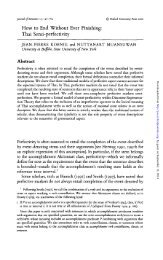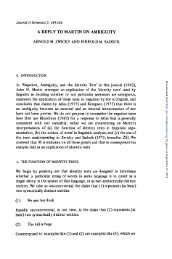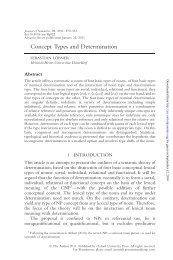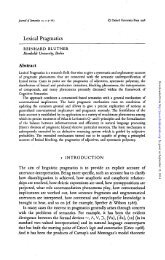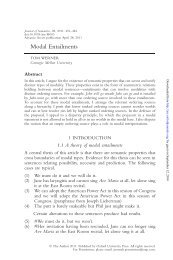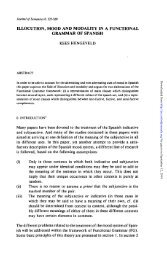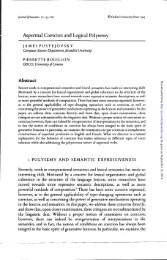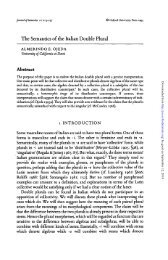Exclusive Company: Only and the Dynamics of Vertical Inference ...
Exclusive Company: Only and the Dynamics of Vertical Inference ...
Exclusive Company: Only and the Dynamics of Vertical Inference ...
Create successful ePaper yourself
Turn your PDF publications into a flip-book with our unique Google optimized e-Paper software.
20 <strong>Only</strong> <strong>and</strong> <strong>the</strong> <strong>Dynamics</strong> <strong>of</strong> <strong>Vertical</strong> <strong>Inference</strong><br />
(53) a. #He almost {budged/slept a wink/touched a drop/spoke to anyone),<br />
b. He barely {budged/slept a wink/touched a drop/spoke to anyone).<br />
This result is especially problematic for Linebarger's <strong>the</strong>ory <strong>of</strong> polarity, on<br />
which an NPI is sanctioned in a given frame in <strong>the</strong> absence <strong>of</strong> overt negation if<br />
it occurs in a proposition p that entails or implicates some o<strong>the</strong>r overtly<br />
negative proposition whose truth in turn 'virtually guarantees' <strong>the</strong> truth <strong>of</strong> p:<br />
(54) The Negative Implicature (NI) account <strong>of</strong> NPI licensing<br />
(Linebarger 1991: 166; cf. Linebarger 1981, 1987)<br />
a. Basic constraint:<br />
A negative polarity item NPI contributes to a sentence S expressing a<br />
proposition P <strong>the</strong> CONVENTIONAL IMPLICATURE that <strong>the</strong> following<br />
condition will be satisfied in <strong>the</strong> context <strong>of</strong> <strong>the</strong> utterance:<br />
•P entails or implicates some proposition NI, which may be identical to<br />
P; in <strong>the</strong> LF <strong>of</strong> some sentence S' expressing this negative implicatum NI,<br />
NPI occurs in <strong>the</strong> immediate scope <strong>of</strong> negation.<br />
b. Conditions on <strong>the</strong> saliency <strong>of</strong> NI:<br />
i) The AVAILABILITY requirement: The speaker must be actively<br />
attempting to convey NI by <strong>the</strong> utterance <strong>of</strong> S.<br />
ii) The STRENGTH requirement: The truth <strong>of</strong> NI itself must virtually<br />
guarantee <strong>the</strong> truth <strong>of</strong> P.<br />
iii) The FOREGROUND requirement: If NI ^ P, <strong>the</strong> representation <strong>of</strong> NPI<br />
may not occur as background information in ei<strong>the</strong>r P or NI, nor<br />
may NI itself serve as background to P.<br />
For (5 5a) <strong>the</strong> strength requirement is presumably not met by (5 5b), but it's hard<br />
to see how <strong>the</strong> truth <strong>of</strong> (55c) could fail to guarantee that <strong>of</strong> (55a), since <strong>the</strong> two<br />
are evidently truth-conditionally identical, as Atlas (1984) has observed.<br />
($5) a. He almost finished.<br />
b. He didn't finish.<br />
c. He didn't quite finish.<br />
Downloaded from http://jos.oxfordjournals.org/ by guest on September 12, 2014<br />
But <strong>the</strong>n (56a) should provide as happy a home for an NPI as (56c) does:<br />
(56) a. He almost finished {some/*any} <strong>of</strong> <strong>the</strong> essays.<br />
b. He didn't finish any <strong>of</strong> <strong>the</strong> essays.<br />
c. He didn't quite finish any <strong>of</strong> <strong>the</strong> essays.<br />
Clearly this is not <strong>the</strong> case.<br />
On <strong>the</strong> o<strong>the</strong>r h<strong>and</strong>, barely passes <strong>the</strong> tests for what we might call downward<br />
quasi-entailment, <strong>the</strong> facts in (52) notwithst<strong>and</strong>ing. If he's barely alive, he's<br />
barely ambulatory, ignoring <strong>the</strong> case in which he's not ambulatory at all. But if<br />
he's almost alive, it doesn't follow that he's almost ambulatory; no downward



